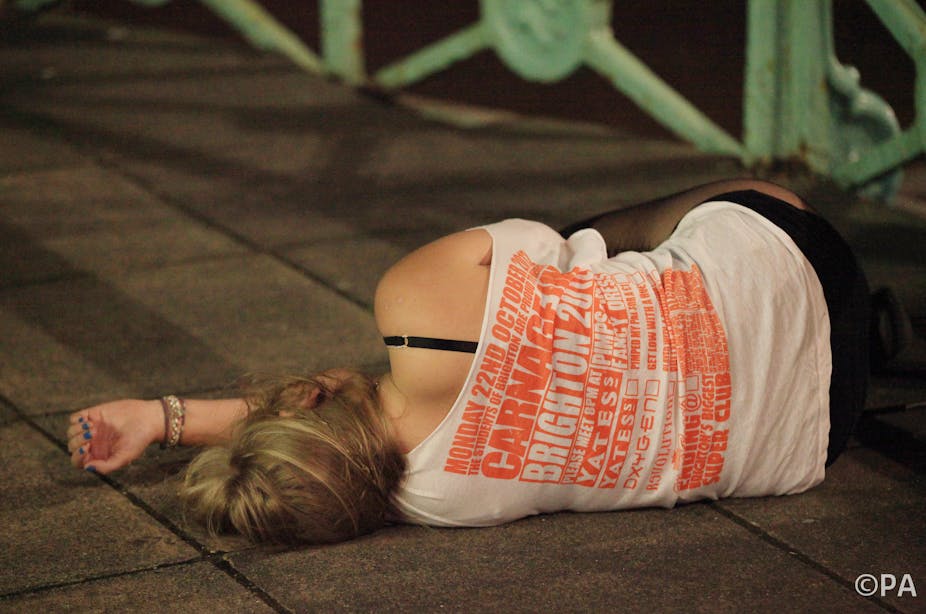It’s a familiar scene across many towns and cities on a Friday and Saturday night - revellers in full swing, up for a night of drinking and dancing. But a few hours later another picture starts to emerge, of flashing emergency lights and sick on the pavement.
But according to researchers at Cardiff University, legal measures to restrict drinks being served to people who are already drunk hasn’t stopped well-known bars in the Welsh capital from continuing to serve. A list of top offenders was compiled using information given by 306 patients with severe intoxication (and the people who accompanied them) who were admitted to Cardiff’s Alcohol Treatment Centre (ATC) about where they’d had their last drink.
Top of the list was Walkabout, the popular Australian-themed pub chain, which was named in more than 8% of cases. The other most cited venues included Oceana (7.84%), Glam (6.8%) and Vodka Revolution (4.9%). Cardiff Students’ Union also made the list and was named in nearly 3% of cases. Nearly 7% of people had had their last drink on the street but the most common place to have had a last drink was in a private residence, which accounted for more than 10% of cases.

While the number of people admitted to the ATC is a minority compared to the number of overall number of night revellers, Professor Jonathan Shepherd, Director of the university’s Violence and Society Research Group, said, “The data strongly suggest that people are being served or have access to alcohol when they are already clearly intoxicated.”
Under the Licensing Act 2003 it’s an offence to sell, or attempt to sell, alcohol to someone who is drunk. But the law is rarely enforced and there are few prosecutions. In 2008, a KPMG review into voluntary standards taken up by the alcohol industry found that although drinks companies were investing significant sums on promoting responsible drinking, “poor practices particularly in the on-trade [were] going unchecked”.
“Commercial imperative generally overrides adherence,” it said. “Inducements to people to drink more and faster, to allow under-age people entry to restricted premises, and blatantly serving intoxicated people are evidence of this conclusion.”
While those admitted to the ATC were not generally injured, campaigners have long argued that weekend drinking is severe burden on Accident and Emergency services, with as many as 70% of weekend admissions in the UK caused by alcohol.
Shepherd said people came into the ATC, set up to take some of the strain from health and police services, in varying states and often brought in by friends, police, paramedics or street pastors. “Some are semi-conscious, or even unconscious, unable to stand up or to get themselves home,” he said. “People are also vulnerable and sexual assaults are a potential danger. People are being sick and there are also social issues, such as not being able to go to work the next day.”
While Shepherd acknowledged that the cases in the ATC were in a minority that “were clearly drunk”, some venue staff might still find it difficult to confront drunk customers. But spotting those who were intoxicated was about applying common sense, he said.
“Previous research we carried out that involved breathalysing hundreds of people across the small hours found that around 10% of people were more than three times over the drink drive limit,” he said. “People in that position can’t walk straight.”
A spokesman for Walkabout said it had clear policies on serving drinks to people who were intoxicated and regularly trained staff in licensing regulations. He said the venue regularly worked with local police and licensing officers.
“We take the matter of serving alcohol to intoxicated customers very seriously and are very surprised by these findings,” he said.
“It is possible that Walkabout has come top of this list because we are the biggest and busiest venue in Cardiff with the highest footfall and longest opening hours, so statistically we are likely to have more log entries than most other bars and clubs in town.”
“We’re an extremely responsible bar operator and have won several awards over the years for running a responsible venue. All our staff are trained to behave in a responsible way, which includes refusing to serve any customer who is felt to be drunk.”

